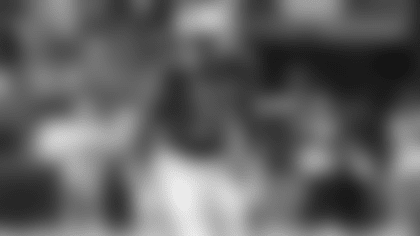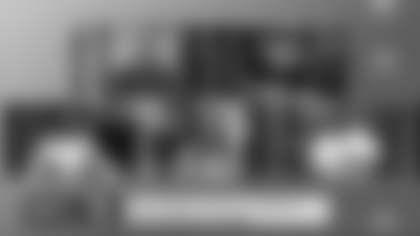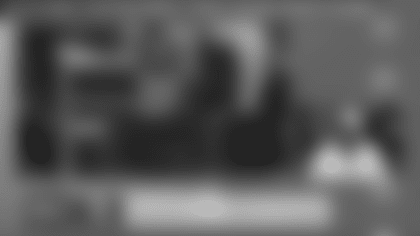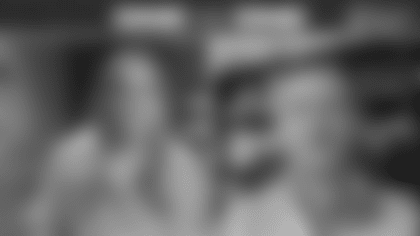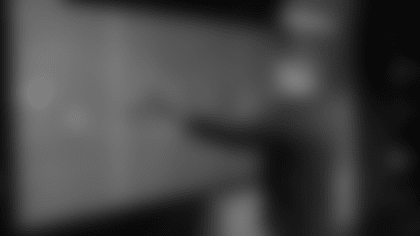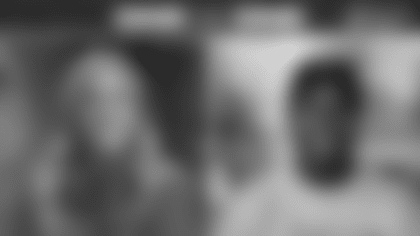Vikings Offensive Coordinator Norv Turner
Q: Talk about Rhett Ellison's versatility and how that has helped the team so far?
A: Rhett's doing the same things he was doing for us a year ago. He's smart, he plays multiple positions, he's a good run blocker, he's an excellent pass protector. When he gets a chance to have the ball in his hands, he's a good runner after the catch. We rely on him to do a great number of things.
Q: A couple of tackles in this game are rookies that have started all three games. How common is it where you can plug in a rookie right away on the offensive line?
A: When I was in Washington, we went back-to-back years and started rookie tackles, the difference being one was an early, early second round pick and one was the third pick in the draft. It's unusual to have a later draft pick start but that's the circumstance we're in and obviously that's the circumstance they're in.
Q: T.J. Clemmings doesn't look like a typical first year guy with his athleticism and strength. Did you notice that right away?
A: He's playing because of an injury and it's a challenge for a young guy to play and it's a challenge for a young guy to go play on the road against Pro Bowl-type players, so we've got our work cut out for us this week. The best thing that I think we've done in the last two weeks is done a good job of protecting our tackles, helping our tackles – T.J. [Clemmings] more so than Matt [Kalil], but these guys make it difficult to do that.
Q: Does having Pro Bowl talent and veteran defensive ends on the Vikings roster help T.J. Clemmings prepare for this type of team?
A: I don't know that you can prepare for this situation in terms of Von Miller and the setting where we're playing them. I've coached against him a number of times, he's a dynamic player, a dynamic rusher, probably the quickest first step in football and if he doesn't have it, 94 [DeMarcus Ware] on the other side does. It's going to be a challenge for our guys.
Q: Do the Broncos have just about as good as it gets with DeMarcus Ware and Von Miller rushing from both sides?
A: Yeah, that's why they lead the league in defense. They lead the league in total defense, they lead the league in third down defense. As I said, we need to manage that part of what we're doing.
Q: Is it a challenge to find a balance between the running and passing game this year?
A: It really hasn't and some of these things get overstated. I like the mixture we've had in run and pass, I like the contribution our passing game has made. The other day we had an 11-play drive that went 80 yards I think and there was 65 yards [passing], and we completed four balls, had a big completion in the red zone. We had a 16-play drive where we converted 3rd down, 3rd-and-8. We had three completions on that drive that contributed to the drive. That's where we are right now. We ran four plays in the fourth quarter. We threw one pass and Teddy [Bridgewater] had pressure off the edge and had to throw it away. So if you only have three quarters of offense, then you're not going to have dynamic numbers. I'm not really about our ability to throw the ball under any circumstance. We're doing what's best for our team right now and what we want our quarterback to do – and I think he's done it the last two weeks – is play winning football, not fantasy football.
Q: Are you going to try and rely on the running game to try and neutralize their pass rush?
A: We're going to go play the best we can and we know when we get Adrian [Peterson] involved it helps us, and we still need to be able to convert third downs, we still need to be able to make big plays in the passing game. I think we've done that the last two weeks. Some things go unnoticed. We threw a ball from our own 8 and get a 40-yard pass interference call. Teddy made a great throw to Charles [Johnson] on the play, that's how you create a pass interference. We need to try and just make sure we can take our shots, have good balance, protect the quarterback. The best thing we've done in the last two weeks is we've had – from Teddy's standpoint – he's thrown one interception, it was in the red zone. San Diego started every one of their drives from their 20 or inside the 20. That means we're not giving the ball up in bad field position.
Q: It seems like the depth at the receiver position might be challenged this week. What is your comfort level with that?
A: I hope we're not. I'm holding out hope on CJ [Charles Johnson] and Jarius [Wright], but we're getting other guys ready to play. That's why you have six receivers, that's why you carry three tight ends. We just have to be flexible and see where we are when we get out there Sunday and see who can go and get them ready to go.
Q: Is Chase Ford someone you can bring into the slot if these guys can't play?
A: He's done that, he's done some of that obviously. We're doing some of that with MyCole Pruitt. We have a chance to have six receivers, five receivers up. If we end up with four receivers up, we've got guys that have played in the slot that would play better than Chase.
Q: What do you see when you look at the Denver secondary?
A: They play a lot of man. They play a very aggressive man and they can do that obviously because they've got an outstanding rush. You look at the teams they played, they gave Baltimore and Detroit – you look at those two games – and they gave them a lot of problems because they can rush and they can cover. And those two cornerbacks have had a lot of success in this league and made a lot of big plays in this league.
Q: There is so much focus on them getting to the quarterback, but how is their run defense?
A: They're solid. They lead the league in defense for a reason. I think they're equally good in both areas. It's just going to have to be an outstanding effort by our guys and we're going to have to have great patience.
Q: The offense has the third best starting field position in the NFL. How much does that boost your guys?
A: It's the whole difference and that's what Coach Zimmer has been talking about since the beginning. If we take care of the football and not turn the ball over and we create negative plays defensively, which we have, whether they're punting backed up or we get a short field like we did the other day. That was what I was talking about with the pass interference. We got the pass interference call so we're punting from the 45, we punt it down inside the 10, next thing you know there is a sack, fumble and we get the ball on the 15. That's what Coach has been preaching all along is playing team football, so there's no question if you're going to win, those are the things that you have to do.
*Vikings Defensive Coordinator George Edwards *
*Coming in, we have got another tough opponent this week. Offensively, another Hall of Fame first ballot quarterback, so we've got our work cut out for us this week as far as trying to get these guys slowed down and keeping them out of the end zone. *
Q: Do you have to study offensive tackles in this league to try and find areas you can expose?
A: Each week we kind of try to look at the strengths and weaknesses of what they're doing. Whether it's in the run game or what they're doing protection-wise. Who it is, the experience that they have, the different looks and those kind of things, we try to take that into account each week as we're going through it. From that aspect of it, it's more about the match-ups, the guys go through and individually look at the match-ups they're going to have throughout the day, but for us schematically, what we can do to attack what it is that they're trying to do.
Q: How is Ty Sambrailo doing at left tackle?
A: He's doing pretty good for his first year starting. Offensively, it's a new scheme, him picking it up not only as a rookie, but I think their whole offense altogether, I think you can just see them getting better from week to week.
Q: Is tackle a position you see guys grow into pretty quickly?
A: I think it's all done on an individual basis. What they bring to the table, their past experiences, how well they just adjust to the offense that they're familiar with, certain techniques, fundamentals that they're asking each one to do. I think that's more on an individual basis than it is to say it's an easier position to come in and adjust to.
Q: Have you made adjustments in the run defense after the San Francisco game?
A: I can't even think back that far. The biggest thing, we've just been trying to come in and attack the fundamentals and the techniques that we're working each week. Guys have come in and bought in and worked their butts off, whether it's in individual, you can see it transfer to the team and then you can see it transfer into the game. I think that it's a credit to those guys of believing in what it is we're trying to get accomplished and then going out and executing it at a high level.
Q: Have you seen Linval Joseph develop more in his second year in the system?
A: I think so. I think Linval has done a great job of coming in and adjusting to the different things that we've asked him to do, technique and fundamental-wise. You look at him last year and just saw how he progressed from the start of the season to the end of the season and then you look at this whole offseason. Last year he missed a lot of time in the offseason, this offseason he's been here, been able to work, carry it through training camp. He's just bought in and I'll tell you, he's really done a nice job for us inside help keeping those linebackers free and being able to get on and off of blocks himself and make some plays. He's done a great job of us.
Q: What do you see when you look at the Broncos running attack?
A: I think the biggest thing identity-wise is, they've changed as the weeks have progressed. I think that's the biggest thing. Last week they went to a lot of pistol runs, I think you just see them steadily getting better each week as they've grown within this offense. Like I said, it's a new offense for them and they're working through it. They definitely have an explosive backfield. He [C.J. Anderson] can run the ball very good, he's very good on the presses, very good on the bellies, good vision to bounce it outside. They have the capability and you just see them getting better. Last week you saw them out of the pistol, they ran the ball a little bit more effective, I think. The offensive line is doing a good job of stretching the zones up front. [Coach Gary] Kubiak has always had a good running attack wherever he's been, you look at him back in Houston, you look at him back in Baltimore, I mean those guys believe in running the football. It's not from a lack of trying, I think it's just them getting on the same page, they seem to be getting better each week.
Q: Is Linval fine in his unsung role of consuming blockers to keep linebackers free?
A: There's no doubt about it. I think if you'd ask anybody on our defense, a guy that doesn't get as much recognition as he probably should is him because he does play the nose position and it's a lot of dirty work in there, but he does an excellent job. To be honest with you, he isn't just using up the linemen, he's able to get on and off a block and make a play himself, or at least affect the play, where the running back has got to cut back sooner than he wants to or either he's got to bounce a lot quicker than he wants to. From that aspect of it, he really does a nice job in there for what we're asking him to do.* *
Q: What do you attribute his ability to get off blocks to, his strength and conditioning or his technique?
A: I think it's a combination of both. He's a diligent worker in the offseason, during the season as far as keeping up his strength levels. The biggest thing is he hasn't had to fight through a lot of the injuries that he had last year and you can just see him getting better each and every week and that's the thing we try to get everybody to do, to come out here and compete and get better each week. He's bought in and done a nice job of that.
Q: How do you balance your rotation on defense with wanting to get snap percentages?
A: I think we look at each situation differently. Each team, they haven't been in a huddle, last week wasn't in a huddle, this week will be very similar. We try to keep up with the play count and the effectiveness of what it is we're doing. The biggest thing is it's a balance of seeing how many reps guys are playing on special teams and it adds up. Nobody should have to go out there and play a total of all of the plays at one time with the depth and competition that we've got at that position. That's how we try to maintain and keep up with how many plays is this guy playing in a game, the effectiveness, was it a long drive, was it a long one, was it a short drive, was it a three-and-out? All of those things come into play as we're monitoring it through the course of the game.
Q: Who counts the snaps?
A: I think each individual coach keeps up with how many plays his players are playing.
Q: So the position coaches have to keep track of it?
A: Well, you've got to think, we've got guys in the box that are looking down, they're keeping up with how many times we were in base, how many times we were in sub, who was in this rotation. Between the different packages and keeping up with how many plays are going on in each drive, between the series we kind of have a grasp of what's going on numbers-wise.
Q: How do you feel Trae Waynes did?
A: For his first time in a live game we thought he did a good job. He left some plays out there, he had a chance to go make some plays, but like I told you, he's been competing every day. When his number was called he was able to show up and get in there do what we asked him to do. He's just continuing to just keep working and getting better each week. Q: Is there any positives to Trae Waynes being thrust into game action?
A: I don't know if that's a positive or not. We try to get guys to realize that when your number is called, you've got to be ready to go. We don't know when that's going to be. From game planning from week-to-week and how we're going to do the match-ups, you could know going in, you could know on the spot, somebody could get injured, next man up philosophy. We just try to preach that you're out here to get better every day and be prepared because you never know when your opportunity is going to come.
Q: What do you like in Brock Vereen?
A: We looked at him when he was coming out in the draft. A very smart kid, a very athletic kid, seems to be a mentally strong kid. Just going back to the draft, we saw how much he had played at the University of Minnesota, we just kind of went with that. I know he's in there today, we're going to take a look at him starting today.
Q: Will Brock Vereen impact the starting safety spot opposite of Harrison Smith?
A: We lost someone on our practice and we were looking to fill that spot, he was available. I think it was just the timing of it. Like I said, we had knowledge of him coming out. We got ready for him when he came out in the draft, he was available and we just lost a guy on our practice squad, so I think that came into play with it, just the timing of it.
Q: Do you envision him as more of a strong or a free safety?
A: I don't know. Once we get him and here just see what he does. We sort of have to go through it and put him in there and evaluate him as we go.
*Vikings Special Teams Coordinator Mike Priefer *
Exciting weekend coming up obviously. I spent two years in Denver and they've got a very, very good team, great organization, awesome owner, outstanding fans, so it's going to be fun for me to go back. Obviously they're a very good football team and we've got our work cut out for us, but that's what the NFL is all about, that's what challenges are every week, that's what they're all about. You've got to prepare and get ready to go.
Q: You guys are among the league leaders in both starting field position and opponent's starting field position. What has attributed to that success?
A: I think that's a combination. A term that you guys have heard me say many times is complementary football and it's a combination of the offense, defense and special teams working together to help our football team field position and that's our job. As a special teams unit on kickoff and punt, we're supposed to flip the field for the defense, and punt return and kickoff return we're supposed to be out there making big plays, so the offense has a good starting drive start. Our defense has caused some turnovers, which has helped. Our offense has had to drive the length of the field a few times or at least gotten to the 50 where we can plus-50 punt, we can pin them down inside the 10-yard line. So to me, the last two games especially have been really good complementary football games and I know that's what Coach Zimmer asks of us on special teams and so far guys are doing a good job.
Q: Do you feel Jeff Locke's consistency has really improved this year?
A: Well, first of all, we've only punted it 11 times, which is a good thing for us. That means our offense is moving the ball and holding onto the ball. I think the returns that people have run against us, there have been penalties, so we've been fortunate that our opponents have been penalized, but I also give our guys credit for that, too because they're playing fast, they're playing physical, they're doing a good job causing penalties and that's part about being a good punt and kickoff team is that we cause penalties, so that our opponents start backed up.
Q: You guys have only allowed two punt return yards total all year, right?
A: I think that's what it is. It's early in the year and I'm not a big stat guy, but I think it's only two yards.
Q: How many penalties have there been on the opponents' returns?
A: I think there have been at least three. I know San Fran had the big return called back. They had two penalties on that play. I think Detroit had one or two penalties and this past week San Diego had one or two penalties, so there's been a bunch.
Q: And there are thing that your unit does to create that? Is it because you're more aggressive?
A: Part of it is because our guys are doing a good job of getting off blocks. We have put a big emphasis on getting off blocks at the line of scrimmage. We have big emphasis on our gunners at getting off blocks and double teams. We worked those drills all spring and all summer long. We cause penalties by being aggressive, by being physical, by playing fast, by stacking our man as we go down the field, the little things that I think our guys have bought into that I think we've done pretty well so far this year.
Q: How should people interpret how Jeff Locke has performed with so few returns and a low net average?
A: It won't rank really high right now because we've had a lot of plus-50 punts. He's had 6 punts downed inside the 20 or fair caught inside the 20. Out of 11 punts, that's obviously more than 50%. That's my math skills at work, guys – Naval Academy education. So when you don't have a lot of punts that are backed up, you're not going to have as many opportunities to have as many high net punts obviously. The other day, he had like a 28-yard net punt. It was a great punt, it was fair caught at the 11. He's doing what we're asking him to do and that's the big thing.
Q: There was one where he was at the 50 and he punted it to the 20. How were you with that one?
A: I was upset with that.
Q: Even if it had been the 19-yard line and it was considered inside the 20?
A: No, I'm not happy with that either. Any time we punt from the 50 or around the 50, our goal is fair caught at the 10 or better. Everything else is a bonus. So there's been a couple punts that we need to do better on and even the punt that was muffed against San Francisco was not a very good punt. We were fortunate. He came up on a shorter punt and muffed it and we recovered it. It was great for us and we had a turnover, but I wasn't even very happy to be honest with you because he didn't punt the ball very well. But on the flip side, he's doing a really nice job. Overall his consistency is better. Three of his four punts were outstanding against San Diego, so we're going in the right direction.
Q: When you say plus-50 punts, is that referring the Aussie-style kick where you can get backwards spin on it?
A: It can be Aussie. I'm talking more field position, but many times around that area is where he uses his Aussie-style punt. Most punters do now.
Q: Did you alert the officials on the defensive holding call on the field goal?
A: Some teams, what they'll do is they'll grab and pull called a pull-and-shoot. They won't call it if there is no shoot. That's what the officials have told us, which is obviously the right thing to do. If you have a defensive holding, it came when he pulled the guy and the guy shot through the gap to try and put pressure on our kick and we did a pretty good job of protecting against that. But it was a great call, and you're right, it's not very called very often.
Q: Do you alert the officials often to keep an eye on something if you see something on the game tape?
A: Sure, absolutely, every week. The umpire will come in and I'll give him our numbers of our field goal team, our punt team guys, so they make sure nobody is downfield illegally, so it gives them an idea. And then, "You got anything else?" And then I might mention a couple of things that I saw on tape. A lot of times – and that crew we just had is an outstanding crew, like many of them – but they already knew, they had already seen tape on that opponent and on San Diego and they knew some of the things that they did.
Q: Do they study the teams the day before the game?
A: I would think so. I know they meet the day before the game, but I think they watch tape throughout the weeks as well.
Q: When do you talk to them? Is it on-site?
A: Before the game, yes.
Q: Seattle had a nice punt return last week where they faked the return with one guy and had Richard Sherman return it. How do you get a return that you want without tipping off that you're going to have a fake punt returner?
A: Well, Richard Sherman, although he is their starting corner, does play on a lot of their special teams. He's a core guy, he's a heck of a football player and he was a punt catcher a little bit in college. I actually worked him out a few years ago when he came out of Stanford. He's normally their corner on punt returns, so when he dropped back and they punted it to him and everybody bluffed one way and he ended up catching the ball. In fact, that's what St. Louis did to Seattle a year ago if you recall, they had the same type of play.
Q: So you have to have a guy back there that you are comfortable with as a punt returner?
A: Absolutely, you absolutely have to have a guy that can catch it.






